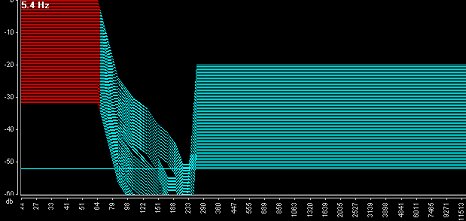|
The
information that comes with this signal takes the form of a story; one that began long before anyone even thought
of Shakti.
It began in the early 1990s. The first generation of the technology (known
as the Koren Helmet) utilized a digital-to-analog (DAC)
converter in a black box, driven by a PC. At the time, the state-of-the-art computer processor was the 286.
Later, when the laboratory group upgraded to faster 386 computers, the same software that had driven the DAC stopped
producing the signals properly. The faster processor was too fast for the software. A simple calibration program
was added to the software, and that fixed the problem.
I had received a DAC from Dr. Persinger just before the problem was solved, and I was quite a computer novice.
The software had a setup program, which I had not run. So, I wasn't setup properly, and even if I had been, I still
would have had an incorrct output. What followed was quite interesting.
Both I in California, and the Lab in Ontario, were getting the same effects from our wrong signals. Theirs was
running too fast, and mine wasn't getting the data from the computer in the first place. But we were both getting
visions, vestibular sensations, and pleasant emotional effects. The most common placements for these sessions was
applying one signal to two coils, located above the ears, over both temporal lobes.
Later, after all the computers were setup correctly, the question appeared: 'why should incorrect signals produce
such successful sessions'?
Although the signals are amplitude modulated, an analysis of the frequencies yielded an answer. The output from
both my computer (not setup), and the main lab's computer (too fast) were possibly the same: No signal at all.
The signal consisted of the noise from the DAC unit.
Let's look at it.
|

FIG 1) Display of frequencies in noise captured from the DAC unit.
The peak frequency is 5.4hz, well within the Theta Range. Theta waves are associated with deep meditation, hypnotic
states, imagination and other phenomena.
|
|
|

It's peak frequency is also 5.4hz.
FIG 2) Later, as a part of a totally unrelated effort,
the same analysis was done on another signal - one that derives from the EEG signature for long-term potentiation
(The hippocampal signal). This signal has produced some very phenomenal sessions, including a number of sleep-related
experiences (lucid dreaming, fleeting visions during the twilight state), and enhanced visual acuity.
|
|
|

FIG 3) A simple sine wave with a 5.4hz frequency looks very different.
The efficacy of this signal may relate to it's ability selectively activate the hippocampus, due to the similar
range of frequencies.
It might also relate to the higher frequencies absent in the sine wave.
|
Although his signal has been tried by a few people over both temporal
lobes, no other presentations have been tried. This includes presentations over only one side. If you are not comfortable
using less-well tested signals, do not use this one.
When beginning to use any signal, it's a good idea to begin with shorter
sessions.
When you're planning to use a signal over only one side, it's good to
try it over each side to see which side feels best with that signal for you.
10 minute sessions are usually sufficient.
When beginning to use any signal, it's a good idea to begin with shorter sessions.
When you're planning to use a signal over only one side, it's good to try it over
each side to see which side feels best with that signal for you.
|
|